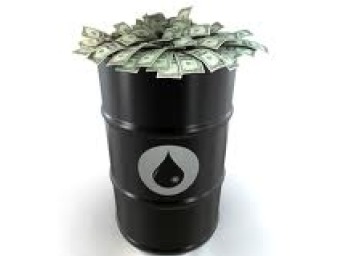One of my vehicles is a 6.7L Diesel Dodge Ram 3500 (dually) so falling price of oil benefits me greatly. Additionally, with the winter upon us, cheaper heating bills are an excellent financial break that many North Americans desperately need.
By Dmitry Tamoikin

And of course let’s not forget that nearly everything either depends on oil – like food production, or is made of it – such as plastics and other synthetic products. Thus, declining cost of oil does mean lower prices for nearly everything we consume or use.
Without a doubt this is good news for the struggling middle class. However, falling oil prices are bad for big business since they equate to loss of revenue, and here lays the problem!
Multinational corporations (sector-wide) do not intentionally loose money without a good reason. Some MNC’s do loose big, like car manufactures or banks during the 2008-2011 financial crisis – but not all and not at the same time. That’s what we are seeing now – all major Western oil producers across the globe are taking massive revenue losses without putting up a fight.
Other major businesses that use or depend on oil also are sitting tight. That’s very strange. Have they finally decided to share their wealth with the people or is there an alternative agenda at work? I do not know, and to be honest everything that I’ll say below is a mere speculation about what is really happening.
I do however hope to stimulate your curiosity, to get you thinking and asking questions about what is happening because oil is the key to our civilization. It’s the key to the way our governments function and how our economies behave. Without oil we go back to the 19th century so those who control it, to a great extent, dictate the rules of the game on this planet.
Also, before we begin, let’s get this notion out of the way that lower prices benefit corporations because people will buy more of their product. That is certainly true for leisure and luxury brands, but not for oil, food, plastics and chemicals producers who know their products are a real “need” not a “want” for the population.
This means people will go in debt but will still buy gas to drive to work, food to feed their families, plastic and chemical products without which civilized world simply does not function. That is why on average, prices on almost everything we buy only go up. Corporations know they can get away with it.
So who or what controls oil? The answer to this question is simpler than you think – the US dollar (a.k.a. the petrodollar). Of course there are other factors that impact oil prices, but none are as significant as the value of the USD.
If the value of the dollar is high – oil prices are low. That’s because US currency has strong purchasing power which means you need less of it to buy a single barrel of oil. If the dollar is weak – prices of oil are high because you need more USDs to buy that same barrel.
This is very simple stuff, and there is plenty of evidence for it. For example let’s go back and take a look at the 2008-2011 global financial crisis. Most mainstream economists attribute it to the bad credit lending practices, the housing bubble which grew out of that and the riskily, shady or even illegal practises of the major banks in United States and EU.
All of this is true – however in my opinion and recollection of those years, that is not what started that meltdown. The above mentioned issues were the subsequent failures that were caused by one specific catalyst that initiated that crisis. That catalyst was – high price of oil.
Do you remember those early years of the new millennium when quickly rising oil prices started to capture our attention? That was way before the talk of any economic meltdowns, bubbles and so on. It amazes me how quickly everyone forgot what had happened after 9/11 and especially after the invasion of Iraq in 2003.
Gas and diesel prices started to skyrocket! Remember those long gas station line-ups of 2004? I do. Then, those TV commercials louring you to buy fuel in large amounts at locked prices in 2005? How about those massive scandalous earning reports of the oil companies in 2006, have we forgotten it all?
Surprisingly, most people don’t remember those times because they got so used to the current high prices so much that they simply disassociated those years with events that followed. Or perhaps those events got so overshadowed by what is happening now with ISIS, Ebola and economy that people simply blocked them out.
Regardless of the reason, that does not change the fact that between 2003-2006 oil prices tripled. Subsequently products that were made from oil, did the same thing. Naturally the consumer was stuck with a bill – the bill that many were not able to afford.
At that time I was traveling often between Canada and Europe, seeing firsthand what those high oil prices were doing to the average folks all over the world. I remember how North Americans and Europeans were outraged over high cost of fuel.
No one had the extra cash to pay for it, yet all had to. Home heating got way more expensive. Then soon after food prices started to increase because of higher transportation as well as production costs, all due to more expensive fuel. And finally, after several years of this, close to the 2006, the private sector started to buckle under the high cost of goods and services. Everyone wanted to pass their losses down the line to their consumers and clients.
When in 2007 that relay hit the end of the line – meaning struggling middle class, the economic crisis started to unfold. What has stayed unchanged – wages. What did all of this mean, population had no money to pay for their mortgages, credit cards and loans.
People got laid off, some business failed, clients defaulted on their debt, interest wasn’t being paid; a panic started to spread and economy began to slow down. Shortly after speculative investment banks like Goldman Sachs, the inflated housing market and short-sighted car manufactures were in big trouble. In 2008 the financial crisis went global. The rest is history. And again, this is not what I think happened, this is what I remember living through along with many others.
Now that we got this out the way I would like to go back and analyse what impacted the price of oil in those years. The obvious answer is 9/11, the invasion of Afghanistan, then Iraq in 2003, and of course let’s not forget the subsequent long wars that followed. However we must look closer at what exactly did those events do and what aspect of the economy did they impact, because it wasn’t oil!
There’s no denying that 9/11 genuinely shook the US economy. It did not however impact the price of oil that much. In fact, oil remained fairly stable until the invasion of Iraq.
But why would gas prices skyrocket when oil-rich Iraq started to yield more of it than ever before? Keep in mind prior to that war, Iraq was under sanctions preventing the export of oil, so again – the invasion only brought more of it to the international market.
Shouldn’t the price of oil have decreased in value because there was more of it? I believe, and current ongoing conflicts in the Middle East support my theory, that what happened in Afghanistan and Iraq did not have any negative impacts on the global oil production nor did that increase its price. Further more, it is becoming evident that those conflicts were not the reason for rising oil prices, they were the excuse.
Then what did cause that massive price jump? To answer this question we need to look at what was happening parallel to these events – and that was the quickly declining buying power of the US dollar.
It simply fell in value against nearly all other currencies with every passing year, going lower and lower. I say this not because I analyzed this market – I say this because I fully partook in it, making as much as $70,000 at one point, simply by betting against the USD in 2009. It’s not a large sum of money for the Forex traders but it’s enough to know the situation and how that market works.
I also took losses and do remember having to exchange USD to CAD or EUR and receive less and less in return. I remember how weak the dollar was becoming, and how everyone who used it or invested into were frustrated about that. Of course at that time we all believed that USD was falling because the US was engaged in the Middle East.
Now we know that was wrong. Why? See for your self. US is till in Afghanistan and is going back to Iraq, which is worse than ever before. Libya and Syria are in ruins. Tensions with Iran are high to say the least.
ISIS is on a rampage across that entire region. There is a conflict with Russia, which is a major oil producer who is now trading with China in national currencies (meaning they are moving away from the petrodollar). US economy has barely recovered and is still very weak.
And yet the dollar is getting stronger. Logically there is no reason for it, other than someone very high up simply decided that it’s time to increase its value.
To everything said in the previous paragraph let’s add the following – world’s population increased, so did the demand for oil (especially in China). At the same time the total amount of potential oil on the entire planet, as well as all other fossil fuels by the way, has only decreased.
Still oil prices are going down? Let me repeat this again and in a more simplified terms – THE DEMAND FOR FUEL IS GROWING, WINTER IS UP ON US, AND OIL PRICES GO DOWN! That defies logic, rules of business, economical theories and common sense. But that else is happening? We do not need to look far for an explanation, it is evident – the US dollar is growing in value.
If you understood this USD / OIL relationship you must ask – who controls the USD? The answer once again is simple – the Federal Reserve along with the certain government officials of the United States. I also would add the mainstream media to this duo, simply because I see how they are the ones who enforce those ideas onto the general public.
A quick reminder – all currencies today, including the USD, are fiat currencies, meaning they are not supported by any specific commodity such as gold. This of course allows for many types of manipulative strategies to be performed with high degree of accuracy.
Another understanding that I wish to cover is that free markets do exist, even in the currency trade. In fact most of the time it appears that Forex does follow the model of a free market, where supply and demand dictates the rules of the game.

It does however also appear that while that’s the case of 90% of the time, when it is advantageous to the major participants such as Federal Reserve, they interfere by stepping in and change the direction of where the market was heading.
This change can be quick or it can be gradual. It is however almost always attributed to some other external factors such as a war or other major news event. The more sensational that event is the bigger the change to the dollar.
There are many strategies they can employ from flooding the market with currency, to buying it back, to spreading misinformation via high-level channels, or bluntly telling the population what dollar should be perceived as via top news channels.
I personally saw countless examples where ridiculous things like low corn yield in Brazil impacted the USD / EUR exchange rate. As I partook in the Forex market I began to realize that these were excuses for a broader strategy that was being implemented by key players on the market.
Of course I could be dead wrong but that does not change the fact that such capabilities do exist, and in the world of fiat currencies it is all about the perception rather than tangible events. Because of this I cannot say for sure that yes, Fed manipulates the US dollar at their discretion, and this is how they do it… I don’t think anyone can, unless they are on the inside and have hard evidence to prove it.
What I can say is that this is a very real possibility and it is highly feasible for people with government access, ability and power to do these type of manipulations. Manipulations that have worldwide consequences! If you can accept this as a possibility then we must account for it by further exploring what is the end goal of such manipulation.
The theory so far is that together, key top officials in the Federal Reserve, the US government and with the support of major news networks have the capability at critical moments to manipulate the US dollar as they see fit – and have done so in the past.
Major world events, that may have happened intentionally or unintentionally, are simply a public justification for a raise or fall of the US dollar on the international foreign currency exchange market. In turn the USD directly impacts the prices of crude oil that further impact all aspects of global economy. That is my theory that I would like to apply to current world events.
To restate them – we have: chaos in the Middle East, depleting fossil fuel reserves of all types, difficult relations with Russia and an ever-growing demand, dependence as well as need for oil by all nations on this planet. And yet the price of oil is falling while the USD growing. This is highly unusual and thus I theorise that falling fuel prices and the simultaneous rise of US dollar is happening not by the free market but by manipulation.
If so we can derive that this economic manoeuvre is being executed for a specific reason, a reason that is known only by those who are initiating this global strategy. I cannot say weather it is good or bad, or even what their ultimate objectives are. However it’s reasonable to assume that it is not a single but rather several objectives for which a favourable time has come.
Furthermore not all of these objectives may be negative and some may not even succeed. I believe that calculations by people, executing this large scale strategy, are extensive, and they think in terms of multiple targets and priorities, meaning certain failures are expected and accounted for as well.
To give an example, the Fed along with another powerful group of highly influential people, let’s say the oil industry, may be simultaneously trying to:
1 – Collapse / damage competitive energy companies and even sectors.
2 – Cripple economies of independent nations like Russia and Iran.
3 – Give a financial break to the American / European populations.
4 – Execute a major currency exchange operation.
5 – Strengthen the trust of the USD as the world’s reserve currency.
6 – Re-establish the power of the petrodollar.
7 – Degrade ISIS revenues from captured oil fields.
Again, this is just an example of a multistage strategy. Furthermore, let’s say they are not able to degrade Russia and Iran, and on top of it, as a side effect, they know that China, a very fuel hungry nation, will benefit from these low oil prices, in so becoming a much stronger adversary.
If the Fed (or who ever is doing this) calculations show that the pros outweigh the cons they may go forward with such a strategy simply because it is advantageous to them at the time.
The point of this article is not an attempt to predict what “the powers that be” have in mind, although that is certainly worth a try, the idea is to realize that something is happening and you should, just in case, brace yourself for impact. If things improve, so be it, no harm done, however if economy turns for the worst at the very least you will be prepared.
Imagine if you had the foresight of investing into gold, that was stagnating prior the Global Financial Crisis of 2008-2011, and afterwards skyrocketed. Or if you are one of those people that was lured into a low mortgage rates and then lost your home because foreclosure after the housing bubble burst – what if you avoided that by exercising caution.
Well now once again is a time of uncertainty and high probability that something unpredictable might happen. After all, I think oil prices are not going down without a good reason. USD is behaving very unusually and outside of the economic trends. This means change, for the good for the bad – I do not know.
My advice is to mimic the Chinese by hedging your position so you win in any situation and risk as little as possible. What does this mean in real world? One (if means allow) – invest up to 20% of your saving into gold, 20% into farmlands, 20% into cash, and 20% in art, antiques and collectibles.
Two – until you figure out what is happening with the dollar and oil – do not take any unnecessary financial risks. Save as much as possible. Be conservative in your spending. Also put away major decisions like buying a car until economy starts to make sense to you. Finally, invest in your own physical safety (this includes your family).
Purchase a firearm and learn how to use it, if you haven’t done so already. Have extra food and water to that will last you more than a month. And finally educate yourself as much as possible about economy, politics, history, environment, health and even survival. By covering all your basis you greatly increase your chances of withstanding even the most severe economic downturns.
If the USD becomes strong while oil remains cheap and nothing happens – you have gained extra knowledge, security and skills. If this is some sort of manipulation with a bad outcome for the middle class (which is happening more and more nowadays) you are also well prepared to face whatever comes next.
The point of this article is not to show off my foresight but to get you, the reader, to think outside the box, anticipate multiple outcomes and be prepared. These are standard practises for most military commanders and no one ever accused them of thinking too much about hypothetical scenarios. On the contrary – such thinking is encouraged.
Lastly, because of the theoretical nature of this article, I do not wish to be perceived as some one who has the sole monopoly on the truth. Above that I have no problem saying that – I’m open to changing my views should strong evidence point elsewhere. In light of this I welcome your comments and encourage discussion!
PS: An art investment suggestion for veterans: Good quality vintage firearms are very well appreciated in value, especially those that were made between 1930s and 1980s. That’s because they are still highly functional but at the same time old enough to be collectible. Consider buying them as an art investment, and as a security tool. Also many art buyers who are into survival have pointed out to me that reliable non-complex firearms (with ammo) will be more valuable than gold in any large scale crisis situation.
Disclaimer: This article does not constitute as any type of financial or security advice. All statements in this report are an opinion. Act at your own risk.
Dmitry Tamoikin is Founder & CEO of Earth Sphere Development Company (ESDC). Dmitry Tamoikin specializes in project development and venture capital.
He has written and co-authored several publications about art, antiques and collectibles. Dmitry is most known for writing three world’s first books about Soviet gold jewelry, launching the Soviet gold and silver market and selling the XVI century Solovetsky Iconostasis for $5 million US [the most expensive icon ever sold to date].
He is also passionate about protecting the ecosystem in a realistic and timely way.
Above all, Dmitry believes that with the current technologies it is possible to merge profit with sustainability, in so achieving a truly advanced civilization on planet Earth.
All content herein is owned by author exclusively. Expressed opinions are NOT necessarily the views of VNR, authors, affiliates, advertisers, sponsors, partners, technicians, or VT Network. Some content may be satirical in nature.
All images within are full responsibility of the author and NOT VNR.
Read Full Policy Notice - Comment Policy



























